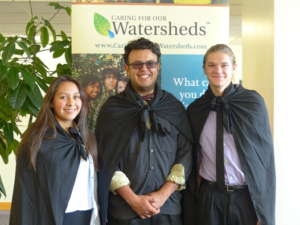2015 Greeley, Colorado, USA

In order to reduce the use of pesticides in their city this team sought to put up bat houses around the Poudre Learning Center area. They discovered the Greeley parks and recreation department spends $50,000 annually on pesticides alone. Strategically, the main focus of the project is to reduce the amount of pesticide sprayed around Greeley. By hosting bats such as the Brazilian free-tailed bat, little brown bat, and the Canyon bat who all share a common appetite for mosquitoes, the population of mosquitoes will go down naturally. Mosquitoes can carry and spread diseases which factors greatly into why the city puts so much into controlling the population of the mosquitoes. However, the chemicals in pesticides have negative consequences such as affecting human health if ingested and the health of the entire watershed. To best reduce the use of pesticides the students wanted to show that it is best to work with nature to control the mosquito population and prevent chemical compounds from getting into the water. By raising awareness and showing the city bats can help control the mosquito population, the students hope that the use of pesticides will go down. It is crucial to protect our local watersheds for not only ourselves, but the generations to follow.
Eventually the mosquito population in the summer will rise, but the bat homes around the Poudre River will host the bats that feed on mosquitoes. Instead of using $50,000 worth of pesticides Greeley can decrease the amount of sprayed pesticides. The surrounding environment will benefit greatly especially the watershed because significantly fewer chemicals run into the water. Fewer chemicals equal healthier aquatic biomes and species – including humans – which survive on the Poudre watershed.